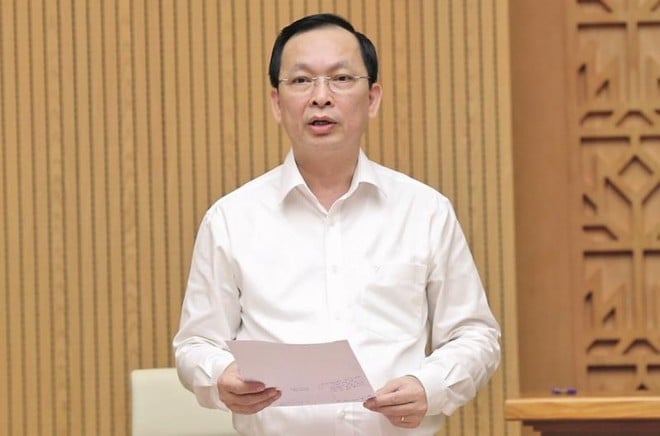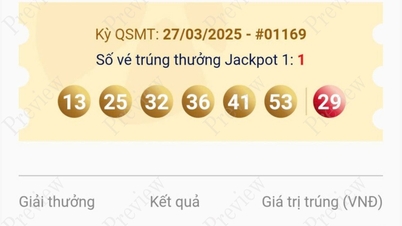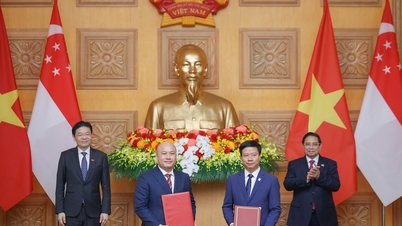ANTD.VN - Deputy Governor of the State Bank of Vietnam Dao Minh Tu affirmed that the State Bank of Vietnam will operate the exchange rate stably, not allowing the psychology of hoarding foreign currency to occur, while striving to further reduce interest rates, not excluding further reductions in operating interest rates.
According to Deputy Governor of the State Bank of Vietnam (SBV) Dao Minh Tu, the SBV remains steadfast in its goal of ensuring macroeconomic stability and exchange rate stability.
Currently, the price of gold and USD are increasing according to the world price, the market supply and demand at certain times are sometimes high and sometimes low. However, the Deputy Governor affirmed that he will manage the exchange rate stably.
“Businesses can rest assured about the exchange rate. Currently, the exchange rate is still fluctuating within the permitted range. We affirm that we will not allow the psychology of hoarding foreign currency waiting for the exchange rate to increase. Currently, abundant foreign exchange reserves, FDI capital flows continue to grow, other foreign currency sources are also developing positively... are the basis for stabilizing the exchange rate,” said the Deputy Governor.
Although there are some concerns about the “dancing” exchange rate, according to the leader of the State Bank, the market must accept the ups and downs. “If it is left to freeze, it is no longer a market economy. There cannot be constancy in the exchange rate,” said Mr. Tu.
 |
Deputy Governor of the State Bank Dao Minh Tu |
Regarding interest rates, the Deputy Governor said that since the beginning of the year, liquidity has been abundant, banks have excess capital, and the amount of capital in banks is quite large. The State Bank has also had many solutions to help businesses in difficulty, such as lowering operating interest rates, thereby reducing the cost of capital for commercial banks, and banks have the conditions to lower interest rates for businesses.
Businesses that are having difficulty paying their debts will be given a deferral to help them be resilient.
However, the Deputy Governor admitted that currently some business loans still have to bear high interest rates, but mainly old loans.
Although the right to decide on lending interest rates belongs to commercial banks, the State Bank's leaders also reminded banks to regulate interest rates in accordance with the general level, because this is a mandatory requirement for banks to compete with each other.
“Commercial banks must calculate and cannot stubbornly keep high interest rates because “no one will play” in the context of an increasingly open and transparent market in terms of prices and interest rates,” said the leader of the State Bank of Vietnam.
“There are hundreds of large and small banks nationwide, not to mention consumer finance companies, people’s credit funds… There is no reason for businesses to depend on a bank. If a bank is in difficulty, they can completely switch to another bank. This is the borrower’s right to choose according to the market mechanism. If there are no businesses, who will the bank live with? Banks need businesses. Only healthy businesses that make profits can repay their debts to the bank.
Therefore, it is necessary to remove difficulties for businesses. If banks only look at achieving profit targets without lowering interest rates, how can things be stable?", the Deputy Governor reminded.
Therefore, in addition to the four state-owned commercial banks that have taken the lead in deeply lowering interest rates, the Deputy Governor requested that banks continue to proactively reduce lending rates, especially for old loans.
Regarding interest rate management in the coming time, Deputy Governor Dao Minh Tu said that the State Bank will continue to operate in a stable direction, further reducing when conditions are available, and even the operating interest rate can be further reduced if conditions are suitable.
However, the representative of the State Bank also admitted that interest rate management is the most difficult problem in macroeconomic management today.
“When interest rates fall sharply, exchange rate stability is at risk of being disrupted, affecting foreign debt, national credit rating, etc. This forces the State Bank to consider and harmonize many factors in monetary policy management,” said Mr. Tu.
Source link


![[Photo] More than 17,000 candidates participate in the 2025 SPT Competency Assessment Test of Hanoi National University of Education](https://vphoto.vietnam.vn/thumb/1200x675/vietnam/resource/IMAGE/2025/5/17/e538d9a1636c407cbb211b314e6303fd)

![[Photo] Prime Minister Pham Minh Chinh chairs meeting on science and technology development](https://vphoto.vietnam.vn/thumb/1200x675/vietnam/resource/IMAGE/2025/5/17/ae80dd74c384439789b12013c738a045)

![[Photo] Readers line up to visit the photo exhibition and receive a special publication commemorating the 135th birthday of President Ho Chi Minh at Nhan Dan Newspaper](https://vphoto.vietnam.vn/thumb/1200x675/vietnam/resource/IMAGE/2025/5/17/85b3197fc6bd43e6a9ee4db15101005b)





























![[Photo] Nearly 3,000 students moved by stories about soldiers](https://vphoto.vietnam.vn/thumb/1200x675/vietnam/resource/IMAGE/2025/5/17/21da57c8241e42438b423eaa37215e0e)








































































Comment (0)